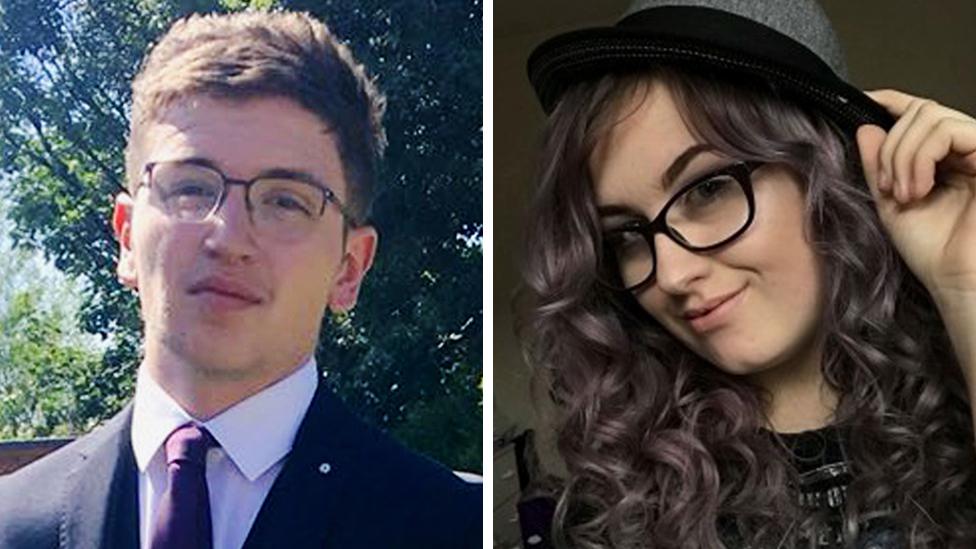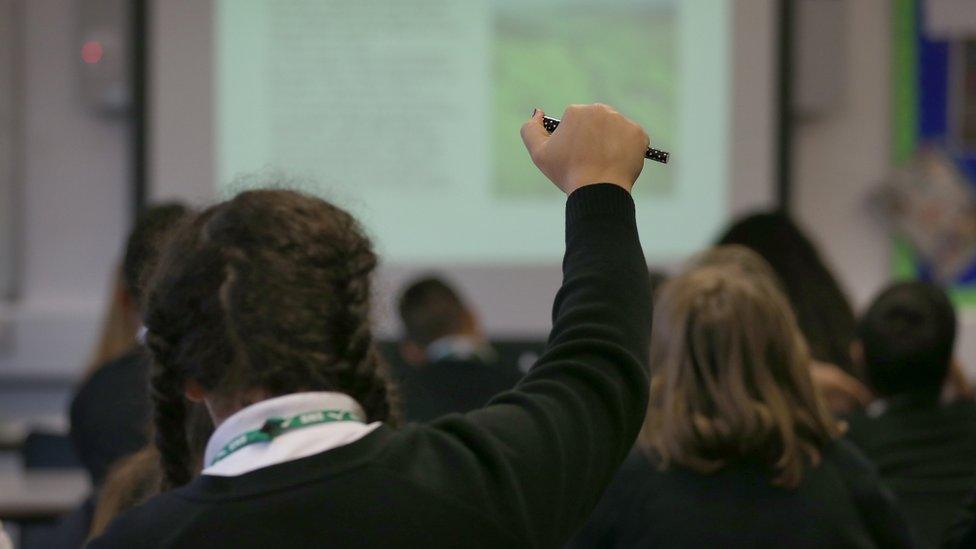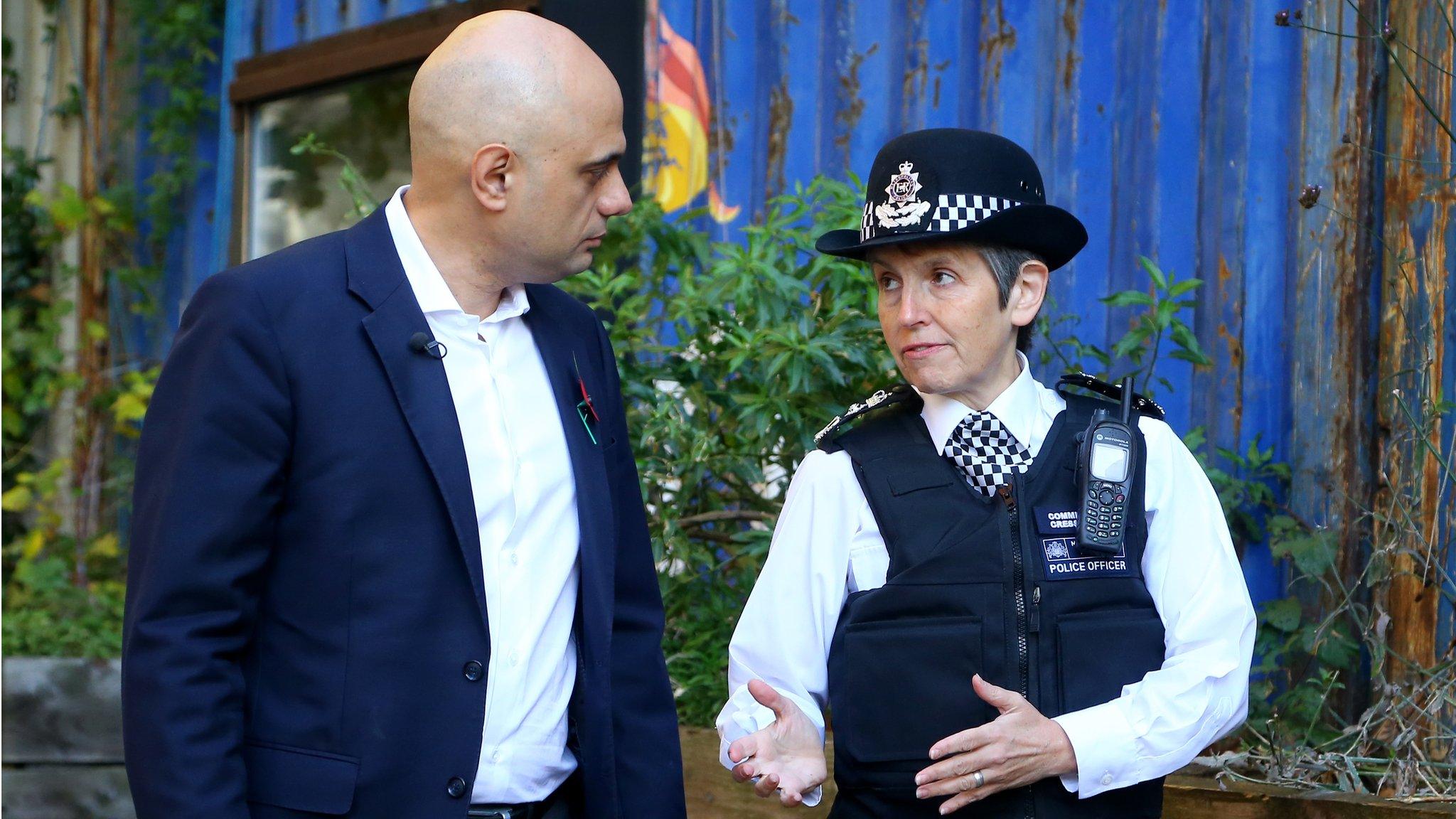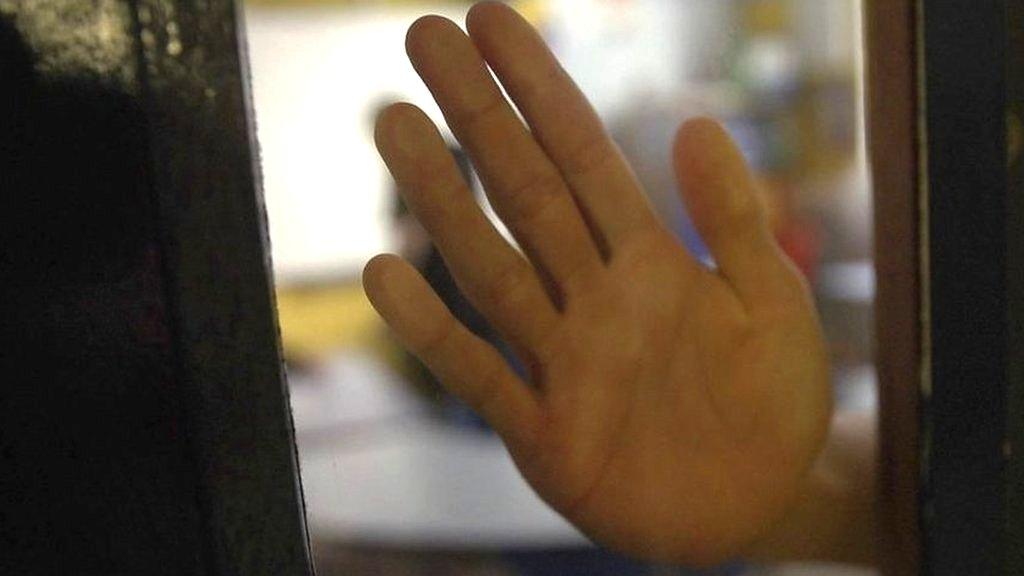Knife crime: Excluded pupils 'sucked into criminality'
- Published

Yousef Makki and Jodie Chesney, both 17, were killed in separate knife attacks two days apart
Theresa May is being warned that a "broken" system of support for troubled and excluded youngsters lies at the heart of a rise in knife crime.
Police commissioners and London's mayor have written to the PM saying pupils, both formally and informally excluded, are being "sucked into criminality".
The letter says cuts to school funds and youth services mean "interventions" for needy youngsters are not happening.
The government said permanent exclusions should be a "last resort".
A spokesperson added that pupil referral units, where children excluded from mainstream school are taught, had a legal duty to safeguard children from dangers such as exploitation, abuse and gang activity.
The letter also called for the system of off-rolling, which sees pupils disappear from school registers without having been formally excluded, to be banned.
It comes a day after high-level talks between the home secretary and police chiefs and follows a spate of fatal teenage stabbings.
On Wednesday, Mrs May said the deaths of young people were "appalling" and announced a summit on knife crime.
The letter to Mrs May - signed by Mayor of London Sadiq Khan and eight police and crime commissioners from England and Wales - said tackling the issue was their top priority, but added there were limits to what they could do.
"There is growing evidence to show that our vulnerable children are more likely to be excluded or off-rolled from school," it said.
"And additionally that excluded children are at much greater risk of becoming either perpetrators or victims of serious youth violence."

What's the link between school exclusions and crime?
Permanent school exclusions in England have been rising since 2013, and so has the number of children being arrested for knife offences.
Almost a quarter of children who said they'd carried a knife in the previous year had been expelled or suspended from school compared with 3% of other children according to figures for England compiled by the Ministry of Justice.
Research commissioned by the Home Office found children in pupil referral units were being targeted by drug gangs.
This doesn't mean school exclusion in itself is causing knife crime though - there are lots of other common factors in these children's lives.
Four times as many knife offenders, and seven times as many excluded children, had a special educational needs statement as the rest of the pupil population.
Young knife offenders in England are about four times as likely to be claiming free school meals. And the rate of permanent exclusion in the most deprived 10% of schools is double that of the least deprived.
Researchers have suggested rising numbers of children with complex needs may partly explain the rise in exclusions.


The letter comes as disagreements continue over the connection between police funding and violent crime.
Metropolitan Police Commissioner Cressida Dick said on Tuesday there "must be some link between crime and police numbers".
Metropolitan Police chief Cressida Dick: "There must be some link"
The London mayor also called on the government to "give us the resources we need to bear down on this issue".
"We've fewer officers now than [at] any time since 2003, fewer community support officers, fewer police staff," Mr Khan told BBC Breakfast.
"Youth centres have closed down as well. The government doesn't appear to be realising that cuts have consequences."
But Chancellor the Exchequer Philip Hammond told BBC Radio 4's Today programme the knife crime problem "isn't just about money".
"I'm not saying that resources don't have anything to do with this challenge, but what we need to see now is a surging of resources from other areas of policing activity into dealing with this spike in knife crime"
"That's what you do in any organisation when you get a specific problem occurring in one area of the operation, you move resources to deal with that."
Knife Crime: “It’s an issue of inequality, not race”
The letter about exclusions from Mr Khan and the police commissioners said: "We firmly believe it is unacceptable that young people can be ejected from the formal education process in this way when we know how vulnerable they become to being sucked into criminality as a result.
"Our schools are facing significant funding pressures and many interventions for our most vulnerable children are being cut.
"This cannot be right and schools must have the necessary resources to deliver good interventions and support to those at risk of exclusion."
The letter highlighted that in two of the country's knife crime hot spots, London and the West Midlands, permanent exclusions rose by 62% and 40% respectively since 2013-14.
It added: "Clearly, the way the education system deals with excluded young people is broken.
"It cannot be right that so many of those who have committed offences have been excluded from school or were outside of mainstream education."
It said it was time to act urgently by giving the responsibilities over all school exclusions back to local authorities.
The National Association of Head Teachers disagreed with this call, saying heads needed to be able to exclude violent pupils in order to keep others safe.
But its general secretary Paul Whiteman said he agreed with much of the letter.
"School budgets are at breaking point and many interventions for our most vulnerable young people are being cut.
"As the letter says, this cannot be right, and schools must have the necessary resources to support young people at risk of exclusion.
"The letter goes on to say that the apparent rise in violent crime amongst young people is the result of deep-seated problems of poverty, inequality, social alienation, cuts to police, local authority and school funding, and a lack of opportunities for young people."
'No support'
Rona Epstein, research fellow at Coventry Law School, said in a recent study that parents of children with special educational needs often found there was "little or no support available" and faced "extremely long waits for diagnoses which could help get that support".
"Some parents had even been asked to keep their children at home because schools said they could not meet their needs," she said.
Last November, Unison highlighted how youth centres have been affected by funding cuts.
A Freedom of Information request by the union revealed how at least 760 youth centres had closed in England since 2012 - leading to the loss of 4,500 youth work jobs.

The government says every England local authority has been given more money for every pupil
An Ofsted spokesman said it had seen no convincing evidence that exclusions, in and of themselves, lead to knife crime or gang violence.
It was, however, likely that exclusions are caused by the same underlying factors as violent crime, and therefore affect many of the same young people.
"Exclusions made in accordance with statutory guidance and leading to placement in a good quality, registered alternative provider should help keep all children safe," he said.
A government spokesperson said excluded children should still be able to engage in high-quality education and £4m had been committed to improve outcome for children outside mainstream schools, including in pupil referral units.
"Since 2017, the UK government has given every local authority in England more money for every pupil in every school," the spokesperson added.
- Published6 March 2019

- Published6 March 2019
- Published13 November 2018
